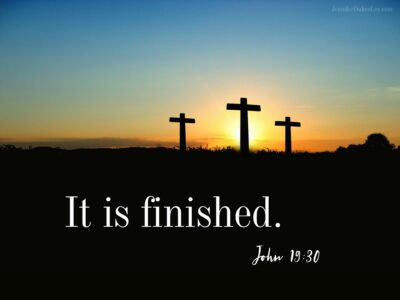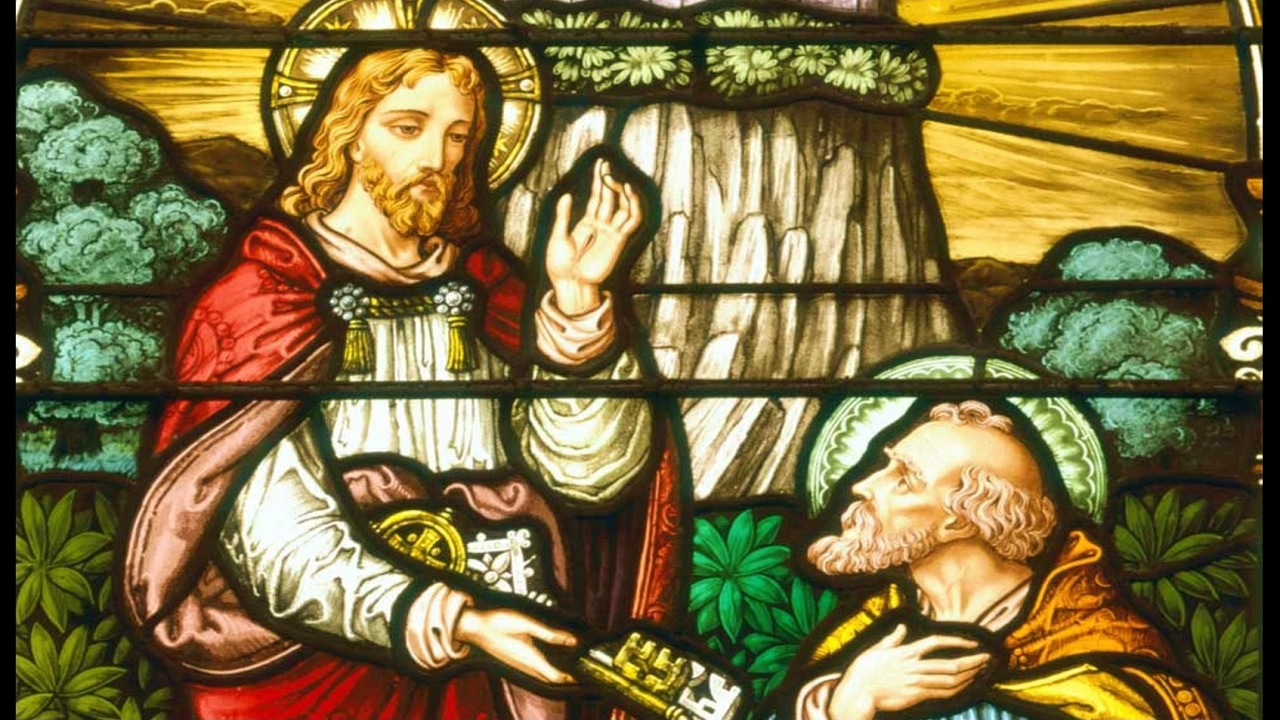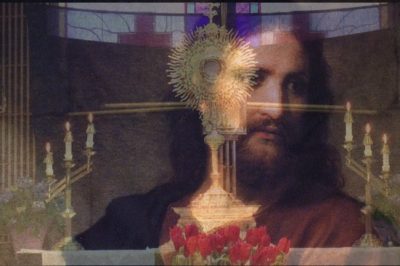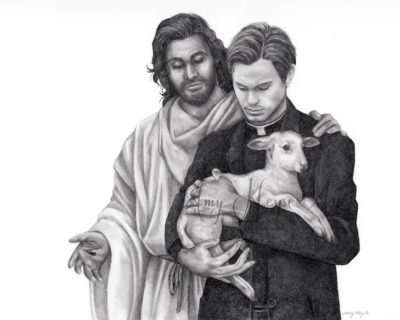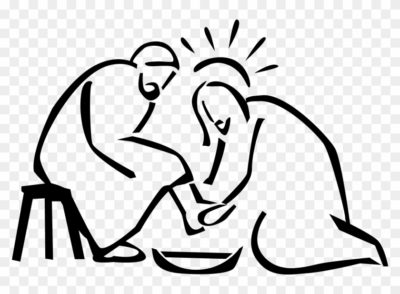May 22, 2022
|by N W
|
0 Comments
|
Commitment, Deacon Mark, Discipleship, Faith, Humility, Obedience, Self-Reflection, Trust
Sixth Sunday of Easter
May 22, 2022 — Year C
Readings: Acts 15:1-2, 22-29 / Ps 67 / Rev 21:10-14, 22-23 / Jn 14:23-29
by Rev. Mr. Mark De La Hunt, Permanent Deacon
I’ll always remember when my wife and I learned the Church’s teachings on birth control. We were newly married and living in Austin, Texas, while I attended the university there. We were a sharing couple on Engaged Encounter weekends and needed to learn about Natural Family Planning, so that we could answer couples’ questions on the retreat weekends. But as we were driving home down I-35 in our Chevy Luv pickup, with no AC and no radio, after the Natural Family Planning class, we were somewhat in a state of shock at what we had learned. We drove in silence for a time, and then I looked over at Catherine, and said, “We are going to do this, aren’t we?” She said, “Yes.” And I remember a feeling of excitement and rightness.
And when we conceived a child a few months later, we were a little frustrated. But the Church proved wiser than us. That child is our oldest son. He has given us much joy over the years. Some angst too, to be sure. But when I needed help at the drop of a hat, when my brother died in New Orleans a few years ago, he dropped everything and flew there to help. And he has helped us on our property, when my health gets me behind. And he and his wife have blessed us with five grandchildren. None of those blessings would have come to us if we had not taken a leap of faith and submitted to the authority of the Church, trusting that the Holy Spirit guides her to all truth (Jn 16:13).
We should have the same feeling about submitting to the Church’s authority as we do to Jesus’, because He gave His moral and teaching authority to the Catholic Church. A great proof of this is the apostle Paul, who received a powerful, life-changing personal revelation from Jesus that no one received. Despite that supernatural moment in his life, he submitted himself to the Church’s authority when a dispute over matters of morals and faith arose (Acts 15:1).
To understand why St. Paul did this, it helps to read the readings in reverse order. In the Gospel of John, Jesus tells the apostles, “Whoever loves me will keep my word… and the Advocate, the Holy Spirit, who the Father will send in my name, will teach you everything and remind you of all that I told you” (Jn 14: 15, 26). He expands this teaching a little later, telling them that “I have many things to say to you, but you cannot bear them now. When the Spirit of truth comes, he will guide you into all the truth” (Jn 16: 12-13). The Church is led to and bound to the truth by the Holy Spirit.
Jesus’ words about the Holy Spirit are fulfilled by the coming of the Holy Spirit at Pentecost. In the first reading, which comes from Acts, we heard that there was a heated debate about whether circumcision was required in order to be saved (Acts 15: 1). To resolve it they each read the scripture and prayed to the Holy Spirit and came to their own personal conclusions. Not! What the reading said was, “It was decided that Paul, Barnabas, and some of the others should go up to Jerusalem to the apostles and elders (same Greek word used for presbyters and bishops elsewhere in the Bible) about this question” (Acts 15:2). The apostles discussed the question and made a proposal, which Peter then announced. This was the first Church Council.
In the second reading, from Revelation, we hear of twelve courses of stone with the names of the twelve apostles on them (Rev 21:14). Here is the thing about foundation stones. They do not sit there passively. They transmit their power to the stone above them, and those stones to the stone above them and on and on. Thus, this analogy gives us a powerful image of Apostolic Succession.
According to Apostolic Succession, today’s bishops are the successors to the apostles, and the bishop of Rome is the successor to Peter who had primacy among them. The bishops in communion with each other and the Pope form the magisterium, which is the teaching arm of the Church. It was to this body that Jesus gave His authority and the promise of the Holy Spirit to guide them to all truth. Therefore, we should be obedient to that authority.
Obedience is not a popular topic. There is a lot of talk about freedom in our world, but lately, it is increasingly focused on personal beliefs and choices. However, Jesus said, “I am the way, the truth, and the life, and the truth will set us free” (Jn 8:32; 14:6). Our personal opinions will not make us free when they conflict with the Church’s teaching. Through the Holy Spirit, the Church’s teaching is the same as Christ’s teaching. St. Joan of Arc said, “About Jesus Christ and the Church, I simply know they’re just one thing, and we shouldn’t complicate the matter.”
To be truly free, we must obey Christ who speaks to us through His Church by the Holy Spirit. To speak and to do things contrary to Christ’s teaching is a sin, and sin always enslaves us. Sin is a cruel master that entices us with attractive packaging and then snares us. Sin always has strings or chains attached that latch on to us and pull us away from our brother, Lord, and Savior, Jesus Christ. It dulls our intellect, mutes our creativity, corrupts our charity, and just plain makes us miserable.
What do I mean by “corrupt charity?” One of the best examples is the belief that killing someone is an act of mercy. One example of this is physician-assisted suicide. A Holy Name of Mary parishioner named Bill shared a story that highlights this corrupt charity and contrasts it with the Church’s divinely inspired wisdom.
His brother Joe was dying from COPD, so Bill traveled to see him in the hospital, which was in another state. He asked the nurse what the plan was. She described a process where they would give him morphine and slowly turn down his oxygen until he died. Bill said, “You are going to euthanize him!” The nurse shrugged her shoulders. Bill demanded an alternative plan. They came up with one, and it worked. As a result, they were able to stabilize Joe’s oxygen level so that he could be transported safely back to his home. This gave Joe his final wish to die in his home. God blessed Bill for taking a leap of faith and obeying the Church’s teaching by blessing him and his brother with six more weeks together, and Joe, God bless him, died in the peace and comfort of his own bed, next to his wife.
We can see from both the stories I’ve shared that the Catholic Church has wisdom, but does she claim too much authority? No. I think Peter Kreeft defends her authority well, writing, “Her teachings on matters of morals and faith are non-negotiable, not because she claims too much authority, but because she claims she has none…but Christ’s.” (Kreeft 309)
To help us understand the need to obey and the good that obedience brings, Jesus used the image of Himself as our Good Shepherd (Jn 10). The Good Shepherd calls his sheep by name, and they know Him and follow Him. And if the sheep get into trouble, He lays down His life for them to save them. The sheep obey their shepherd because they know Him. By praying, reading our Bible, and going to Mass we come to know Him. They obey Him because they trust Him to lead them to safe pastures where they will live life abundantly (Jn 10:10). We learn to trust Him by taking leaps of faith and experiencing the good it brings. He calls us by our name, not by a label like Satan does when he calls us by the name of our sin to shame us.
When we, the sheep, disobey, we stray away from the Good Shepherd; this is sin. This is a dangerous time for us. Mind, body, and soul are in danger away from the shepherd. When one sheep strays, it can lead another into danger; sin is contagious. We see this in the world today. Isaiah described this dangerous situation like this, “All we like sheep have gone astray; we have turned every one to his own way” (Is 53:6). Interestingly, this dire warning is in the middle of Isaiah’s passage about the suffering servant, our Good Shepherd and Savior.
When “every one goes his own way,” individuals, communities, cities, states, and nations become unstable and unhappy. This state of affairs was captured beautifully in Psalm 42, “Why are you cast down, O my soul, and why are you disquieted within me?” (Ps 42:5). Jeff Cavins points out that when a sheep is cast down, it means it has fallen over and cannot get up. Cast down sheep are unstable and unhappy, and if the shepherd does not right them, they will die. (Jeff Cavins; Hallow App)
I will close by addressing an issue that may be on your mind when speaking of being obedient to the Catholic Church. The Church consist of laity, consecrated religious, deacons, priests, and bishops, and all are sinners. Some have committed horrific, criminal acts. No human institution is free from sin. However, only the Church is One, Holy, catholic, and Apostolic. It is One through Christ, Holy through the Holy Spirit and catholic (meaning universal) through all of us in communion with all the believers around the world. Finally, it is Apostolic by Jesus’s decree to his disciples. “He who hears you hears me, and he who rejects you rejects me, and he who rejects me rejects him who sent me” (Lk 10:16)” Lord Jesus, who were perfected through obedience, may we choose happiness and abundant life by following and obeying only you, our Good Shepherd, through our Mother Church, Amen.
Citation for Peter Kreeft: “Food for the Soul – Reflections on the Mass Readings for Cycle C.” Published by Word on Fire in 2021.
KEEP READING
 540-586-8988
540-586-8988 

